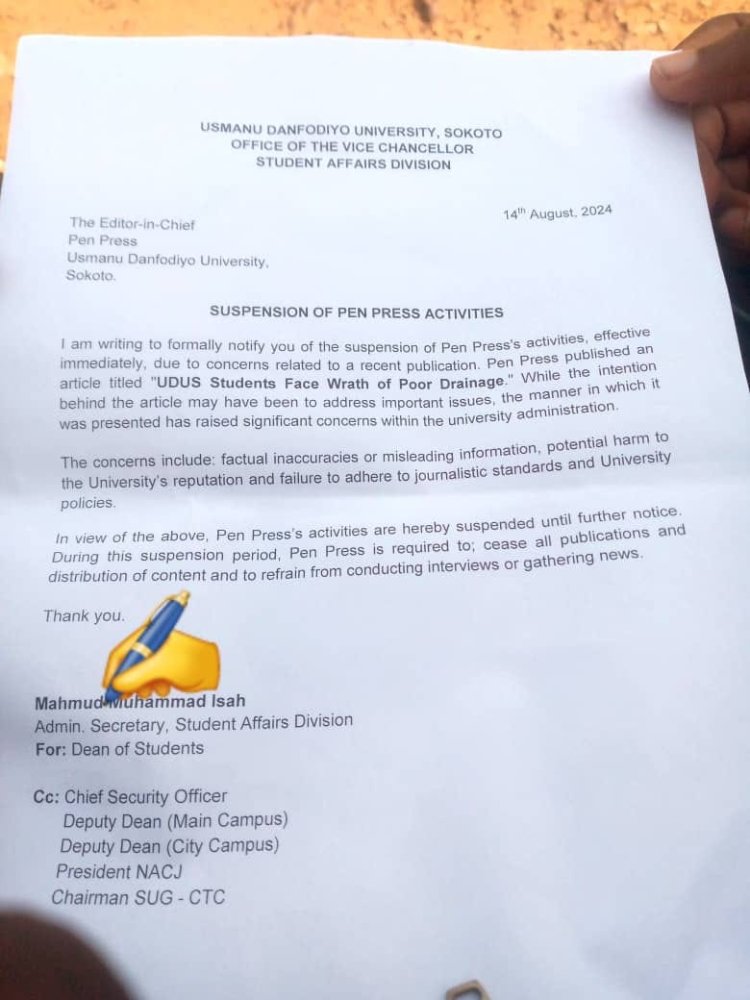Silencing the Pen: The Unjust Suspension of Pen Press and the Struggle for Student Journalism at UDUS
This decision, spurred by a recent publication highlighting the poor drainage conditions in Zamfara Hostel, is not only unjust but represents a dangerous precedent for the future of student journalism at UDUS and beyond.

In an era where free speech and journalistic integrity are increasingly under threat, Usmanu Danfodiyo University, Sokoto (UDUS) has taken a regressive step by suspending the activities of Pen Press, the university’s student-run news outlet. This decision, spurred by a recent publication highlighting the poor drainage conditions in Zamfara Hostel, is not only unjust but represents a dangerous precedent for the future of student journalism at UDUS and beyond.
The Role of Pen Press in Campus Discourse

Pen Press has long been a vital voice within the UDUS community, providing students with an independent platform to express their views, report on campus issues, and hold the university administration accountable. Student journalism serves as a crucial watchdog in any academic institution, ensuring that grievances are heard, and problems are brought to light. The recent publication by Pen Press on the drainage issues in Zamfara Hostel is a textbook example of journalism’s role in addressing real concerns that affect the daily lives of students.
The Fallout: Punishing the Messenger
Rather than addressing the valid concerns raised by the article, the university administration chose to suppress the voice that dared to speak out. The suspension of Pen Press, as detailed in the letter from the Student Affairs Division, cites “factual inaccuracies,” “potential harm to the university’s reputation,” and “failure to adhere to journalistic standards” as reasons for the drastic action. However, the administration’s response appears more concerned with protecting its image than with addressing the legitimate grievances of its students.

By suspending Pen Press, the university sends a clear message: dissent will not be tolerated, and those who dare to challenge the status quo will be silenced. This is a troubling development in an academic environment that should encourage critical thinking, debate, and the free exchange of ideas.
The Real Issue: Poor Living Conditions in Zamfara Hostel
The article that led to Pen Press’s suspension painted a grim picture of life in Zamfara Hostel, particularly in blocks A and C. The poor drainage system, which causes water to splash on students and creates unsanitary conditions, is not a trivial matter. It directly affects the health and well-being of the students who live there. As Fatimah, a resident of A block, poignantly described, the situation makes it nearly impossible to carry out basic activities like washing and cooking without getting drenched by dirty water. Moreover, the risk of disease due to the close proximity of wastewater to drinking water taps is a legitimate concern that should prompt immediate action, not suppression of the discussion.
The university administration’s decision to suspend Pen Press instead of addressing these pressing issues is a gross misstep. The problems in Zamfara Hostel are not just about discomfort; they are about the health and safety of the students. The administration should be prioritizing solutions, such as extending drainage pipes or improving the overall design of the hostel, rather than silencing those who bring these issues to light.
The Need for Support, Not Censorship
Universities should be bastions of free speech, where ideas can be freely expressed and debated. Student journalists, like those at Pen Press, play a crucial role in fostering this environment. By reporting on issues that affect the student body, they contribute to a more informed and engaged campus community. Censoring these voices undermines the very purpose of higher education and discourages students from participating in meaningful discourse.
Instead of punishing student journalists, universities should be supporting them. This includes providing training in journalistic ethics and standards, offering resources to help them conduct thorough and accurate reporting, and most importantly, respecting their role as independent voices. When student journalism is supported, the entire university community benefits from a more transparent and accountable administration.
A Call for Reinstatement and Reform
The suspension of Pen Press is a step in the wrong direction for UDUS. The university administration should immediately reinstate Pen Press and take steps to ensure that student journalists are able to operate without fear of retribution. Moreover, the administration should address the real issue at hand—the poor living conditions in Zamfara Hostel—and work with students to find solutions.
This incident should serve as a wake-up call for universities across Nigeria. The freedom of the press, including student-run outlets, is essential for a healthy and vibrant academic community. Universities must recognize the value of student journalism and protect it at all costs. The alternative—censorship and repression—only serves to stifle the voices that can bring about positive change.





